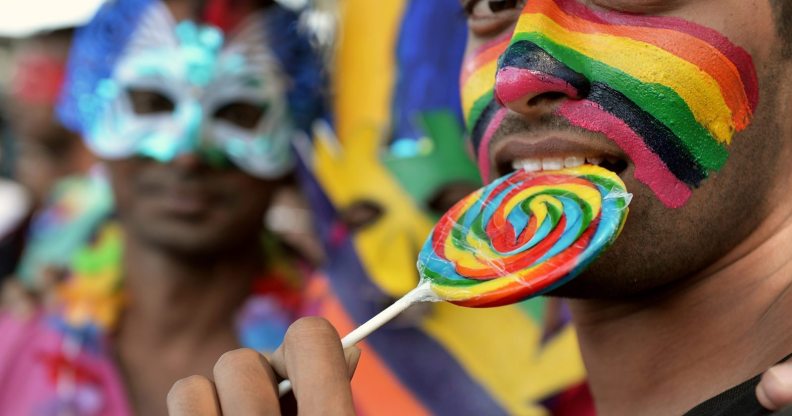Indian churches call for the decriminalisation of homosexuality

(Photo credit should read Manjunath Kiran/AFP/Getty Images)
A coalition of Christian churches in India has called for the country to end its ban on being gay.
The National Council of Churches in India (NCCI), which represents about 14 million people, has published an open letter arguing homosexuality should be decriminalised.
India’s Supreme Court is considering overturning a colonial-era law that criminalises homosexual acts.

“Homosexuality and homo-eroticism have been practiced in India from time immemorial,” the letter says.
It adds: “Homosexual activity was never condemned or criminalized in ancient India.”
The group argues that the anti-gay law is a hangover over British colonialists, who introduced the concept of homophobia to India based on Victorian values.
“Churches in India need to give responsible consideration to the initiative of the Supreme Court of India to review Sec 377 in the light of constitutional rights and the right to privacy, and the gospel of justice and love.

NNCI (NCCI Facebook)
“As followers of the non-conformist Christ, the one who consistently questioned unjust and non-compassionate traditions of public morality, our call is to reject all laws that demonise, criminalise, and exclude human beings, and work to facilitate just inclusive and loving communities.”
The letter comes at a crucial time as Section 377 of the Indian Penal Code, which outlaws sex between men, is to be re-examined by India’s top court to determine its validity.
The court announced last week that the ruling, which was modelled on 16th-century British laws, will be examined before October 2018.
The colonial-era law bans “carnal intercourse against the order of nature with any man, woman or animal”.

(Photo by INDRANIL MUKHERJEE/AFP/Getty Images)
Those convicted under Section 377 can face a life imprisonment.
The decision to examine the law once again comes as the court found that less than 200 people had been convicted for homosexual acts in 2013.
Activists say that the law is more commonly used for convicting those who carried out sexual offences against children with approximately 1,347 cases taking place in 2015.

An Indian supporter of LGBT rights takes part in a Pride March in Mumbai (Photo PUNIT PARANJPE/AFP/Getty Images)
RELATED: Over a billion people are living under British anti-gay laws in the Commonwealth
They also say that the section is being used to blackmail and intimidate LGBTQ Indians as well as to prevent healthcare access for HIV/AIDS.
The court said: “A section of people or individuals who exercise their choice should never remain in a state of fear.
“Choice can’t be allowed to cross boundaries of law but confines of law can’t trample or curtail the inherent right embedded in an individual under article 21 of constitution.”

(Getty)
The ban on homosexual sex was eradicated in 2009 in Delhi high court.
However, it was reinstated four years later by the supreme court.
The decision to reinforce the law was met with international criticism, and India faced condemnation from major establishments including the United Nations.
The retraction was considered largely controversial because of article 21, which guaranteed the right to privacy.

A placard is pictured during a protest by members and supporters of the lesbian, gay, bisexual and transgender (LGBT) community in New Delhi (Photo SAJJAD HUSSAIN/AFP/Getty Images)
The decision to revisit the ruling is believed by experts to be a positive thing.
Anand Grover, a senior lawyer in the country, said that the challenge had “no choice but to succeed”.
Last year, a ruling on a private case set precedent for giving basic human rights to LGBT people.
The ruling, which was on an unrelated privacy case, appeared to affirm that LGBT people deserve basic rights to live, ahead of a wider challenge to Section 377.

An Indian supporter of LGBT rights takes part in a Pride March in Kolkata (Photo Getty Images)
The nine-judge court affirmed: “Sexual orientation is an essential attribute of privacy.
“Discrimination against an individual on the basis of sexual orientation is deeply offensive to the dignity and self-worth of the individual.”
Equality demands that the sexual orientation of each individual in society must be protected on an even platform.
“The right to privacy and the protection of sexual orientation lie at the core of the fundamental rights guaranteed by [the Constituion].”

An Indian supporter of LGBT rights takes part in a Pride March (Photo Getty Images)
The decision also challenged the ruling that reinstated Section 377, which initially said the law was not discriminatory because it only impacted a “minuscule fraction of the country’s population”.
The Supreme Court ruled: “That ‘a minuscule fraction of the country’s population constitutes lesbians, gays, bisexuals or transgenders’ is not a sustainable basis to deny the right to privacy.
“The purpose of elevating certain rights to the stature of guaranteed fundamental rights is to insulate their exercise from the disdain of majorities, whether legislative or popular.

(Photo by SAJJAD HUSSAIN/AFP/Getty Images)
“The guarantee of constitutional rights does not depend upon their exercise being favourably regarded by majoritarian opinion. The test of popular acceptance does not furnish a valid basis to disregard rights which are conferred with the sanctity of constitutional protection.
“Discrete and insular minorities face grave dangers of discrimination for the simple reason that their views, beliefs or way of life does not accord with the ‘mainstream’.
“Yet in a democratic Constitution founded on the rule of law, their rights are as sacred as those conferred on other citizens to protect their freedoms and liberties.”

